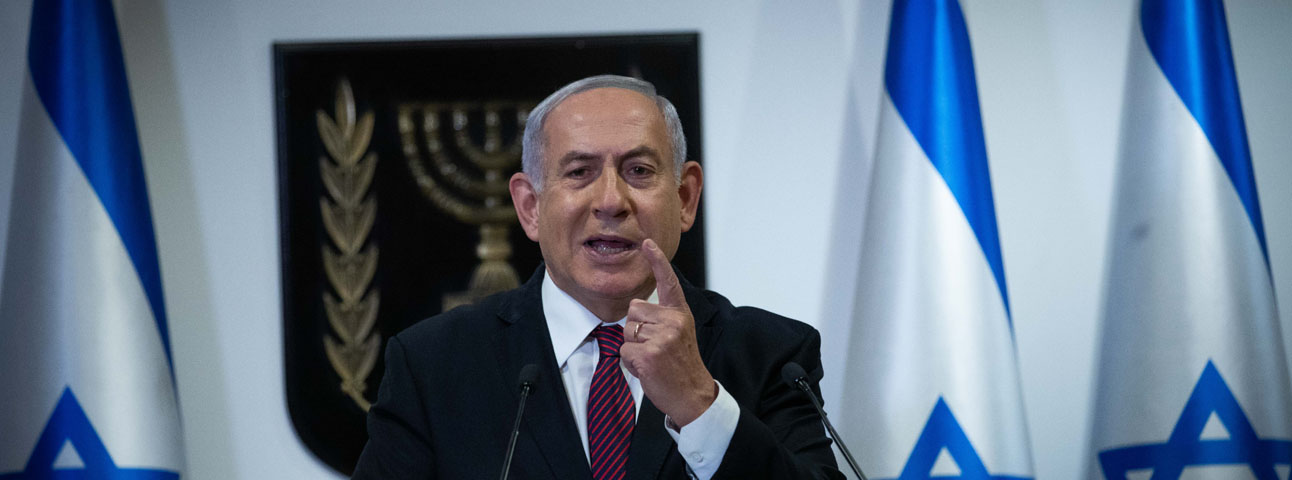How Netanyahu Learned to Love Israeli Arab Parties
The prime minister who once presented Arab political leaders as a threat has legitimized them as potential coalition partners.

Flash 90
This past December, Israeli Prime Minister Benjamin Netanyahu refused to pass a budget during an unprecedented economic crisis, thus dissolving his country’s short-lived unity government and setting up the fourth national election in two years.
Initially, Netanyahu was expected to rely on the three key elements that have driven his electoral success since 1996: an unshakable alliance with the ultra-Orthodox, a fierce determination to crush any potential successor or political rival, and a consistent bid to delegitimize any political partnership that relies on the support of Arab parties.
Over the course of the latest campaign that concluded in March, Netanyahu switched tactics and conducted an open bid to gain support from Arab Israelis. His reason for this about-face was simple: He believed the legitimization of Arab politicians had become critical to his political survival.
Ironically, Netanyahu’s success in accomplishing this latest goal has not only challenged the existing conventions of Israeli politics by turning the Arab parties into parliamentary kingmakers but perhaps also legitimized a potential center-left governing coalition that could eventually oust him from the Prime Minister’s Office. In fact, already in the next few weeks Israel could see a governing coalition voted into office with the support of parties ranging from those to the right of Netanyahu to the far-left and Arab-supported faction.
Once he decided on elections, Netanyahu pulled out his old playbook. First, he made sure that his allies on the more extreme right and in the ultra-Orthodox parties would remain loyal to him throughout his legal travails. He has lavished patronage and budgets on their voters, disregarded their defiance of public health regulations amid soaring COVID-19 infection rates, and recruited them in a joint campaign against the institutions of law and order, which they also distrust. This ensured that they remained by his side after the March elections as well.
At the same time, Netanyahu has continued to display his uncanny ability to dismantle rival political parties through a variety of parliamentary maneuvers, political patronage, and his powers of persuasion. Over the past decade alone, Netanyahu has succeeded in disassembling the Labor party, the Kadima party and—in the latest Knesset—Benny Gantz’s Blue and White. All of these parties were at one time considered viable contenders for leadership and all are now shadows of their former selves or have ceased to exist completely.
In this most recent election, Netanyahu identified a new political threat. Over the course of the previous three rounds of elections in 2019-2020, voter participation among Arab Israelis rose from 49 percent to approximately 65 percent—steadily increasing and moving closer to the estimated 73 percent turnout among Jewish Israelis.
More significantly, following the September 2019 and March 2020 elections, the Arab Israelis’ party—the Joint List—officially recommended Gantz as their candidate for prime minister to President Reuven Rivlin. These were the first two times an Arab-supported party did not remain neutral and instead made a recommendation to the president. Then, in the coalition negotiations that followed, the Joint List was seriously considered to be a partner in forming a Gantz-led center-left government.
Netanyahu has long stigmatized the Arab parties in a way that intimidated most center-left parties into disavowing even the possibility of political cooperation with them.
At the time, Netanyahu successfully defused this threat by painting the Arab parties as extremists and fellow travelers with terrorists. This was a continuation of the strategy that has served him well since the infamous “Netanyahu is good for the Jews” campaign in 1996, when he insinuated that Arab support for his rivals was illegitimate, and most famously in 2015, when he galvanized his supporters by warning that “Arab voters are coming out in droves to the polls.”
Over the years, he has stigmatized the Arab parties in a way that intimidated most representatives of the center-left parties into disavowing even the possibility of political cooperation with Arab parties, as they last did by supporting the coalition without joining the government during the administration of Yitzhak Rabin. This saddled the opposition bloc with a built-in handicap in the race to 61 seats in Israel’s 120-member parliament. After a few months of contemplating the idea of Joint List support in order to win the premiership, Gantz abandoned his potential partnership with the Arab parties and joined forces with Netanyahu instead, leading to the ill-fated unity government that prompted the most recent election.
The article was published in Foreign Policy.
